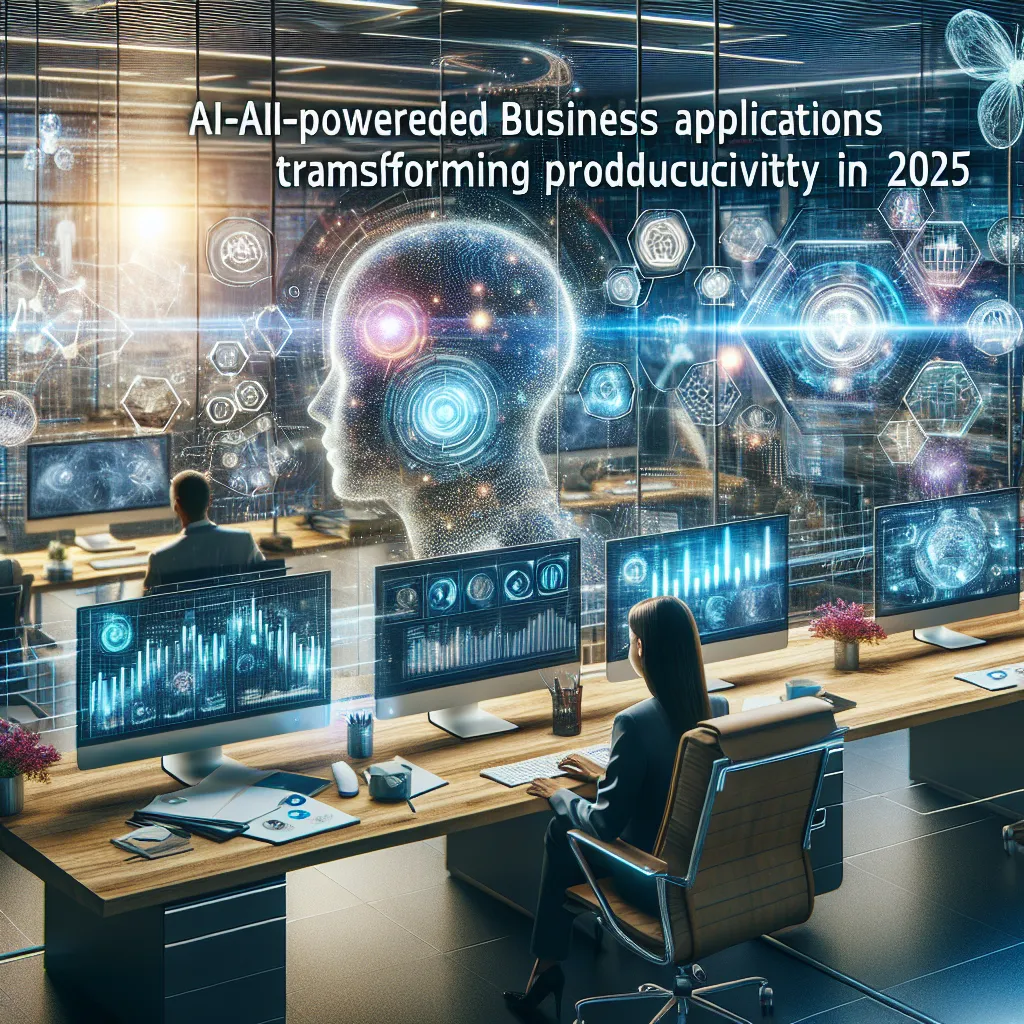AI-powered business applications are no longer just futuristic concepts—they’re the engines currently driving innovation and productivity across industries. As we move through 2025, advanced artificial intelligence is reshaping how organizations operate, collaborate, and scale. From intelligent automation to data-driven decision-making, businesses leveraging AI are gaining a competitive edge that simply can’t be ignored.
In this article, we’ll explore the transformative impact of AI-powered tools on business productivity, practical ways to harness their potential, and expert insights to help your organization thrive in the digital era.
The Rise of AI-Powered Business Applications in 2025
The adoption of AI in business has accelerated rapidly, with organizations of all sizes integrating intelligent tools into their daily workflows. According to recent industry reports, over 85% of enterprises will have deployed at least one AI-powered application by the end of 2025.
"AI is not just a tool for automation; it's a catalyst for reimagining business processes, enabling smarter decisions and unlocking new growth opportunities." - Industry Analyst, 2025
What’s Driving the Shift?
- Data Explosion: Businesses generate more data than ever. AI helps extract insights from this wealth of information.
- Remote & Hybrid Work: Digital collaboration tools powered by AI are essential for distributed teams.
- Customer Expectations: Consumers demand faster, more personalized experiences—AI delivers just that.
- Efficiency Pressures: Organizations seek to do more with less, making automation a top priority.
Key AI-Powered Applications Transforming Productivity
1. Intelligent Automation Platforms
Automation is evolving beyond simple rule-based tasks. Today’s AI-powered platforms can analyze processes, identify inefficiencies, and automate complex workflows across departments like HR, finance, and customer service.
- Automated invoice processing and reconciliation
- AI-driven recruitment and onboarding
- Customer support chatbots and virtual assistants
- Predictive maintenance in manufacturing
Tip: Start with automating repetitive, high-volume tasks to free up your team’s time for more strategic work.
2. AI-Augmented Collaboration Tools
In the era of remote and hybrid work, AI is revolutionizing how teams communicate and collaborate. Smart meeting assistants can summarize discussions, assign action items, and even translate conversations in real time.
- Automatic note-taking and meeting transcription
- AI-powered project management and scheduling
- Language translation and sentiment analysis
- Smart document search and organization
Tip: Leverage AI integrations in your collaboration tools (like Slack, Microsoft Teams, or Zoom) to streamline communication and avoid information overload.
3. Advanced Data Analytics and Decision Support
AI algorithms can process massive datasets in seconds, uncovering trends and insights that would take humans days or weeks to decipher. This empowers leaders to make faster, more informed decisions.
- Real-time data dashboards with AI insight overlays
- Predictive analytics for sales, inventory, and customer behavior
- Automated anomaly detection for risk management
- Personalized business intelligence reports
Tip: Regularly audit your data sources to ensure your AI models are trained on accurate, relevant, and bias-free information.
4. Personalized Customer Engagement
AI is enabling hyper-personalization at scale. From tailored marketing campaigns to dynamic pricing models, businesses can anticipate and meet customer needs like never before.
- AI-driven email and content personalization
- Chatbots providing 24/7 support
- Recommendation engines for e-commerce and services
- Customer sentiment analysis for improved retention
Tip: Use AI to map the entire customer journey and identify key touchpoints for personalized engagement.
How to Implement AI-Powered Applications in Your Business
Adopting AI can seem overwhelming, but a strategic approach ensures a smooth transition and maximizes ROI. Here are practical steps to get started:
- Identify Business Needs: Pinpoint areas where AI can have the biggest impact, such as automating manual processes or improving customer service.
- Choose the Right Tools: Evaluate AI solutions based on scalability, integration capabilities, and ease of use.
- Invest in Data Readiness: Clean, organize, and secure your data to ensure high-quality AI outcomes.
- Train Your Team: Upskill employees on how to use AI-powered applications and interpret AI-generated insights.
- Start Small, Scale Fast: Pilot new tools with a specific team or project, measure results, and expand successful initiatives organization-wide.
Tip: Collaborate with trusted technology partners or AI consultants to accelerate adoption and avoid common pitfalls.
Frequently Asked Questions About AI-Powered Business Applications
Are AI-powered applications only for large enterprises?
No. In 2025, many AI tools are cloud-based and scalable, making them accessible and affordable for small and medium-sized businesses. Startups can also leverage AI to gain agility and compete with larger players.
Will AI replace human jobs?
While AI automates repetitive tasks, it also creates new opportunities for employees to focus on strategic, creative, and interpersonal roles. The future of work is about human-AI collaboration, not replacement.
How secure are AI-powered business tools?
Leading AI vendors prioritize data security and privacy, employing encryption, access controls, and compliance with global regulations. However, it’s essential for businesses to vet vendors and implement robust internal data policies.
How can I measure the ROI of AI tools?
Track key performance indicators (KPIs) such as time saved, reduced errors, increased sales, and improved customer satisfaction. Many AI tools provide built-in analytics to monitor their impact.
What skills do employees need to succeed with AI?
Beyond technical know-how, employees should develop critical thinking, data literacy, and adaptability to effectively collaborate with AI systems.
Expert Tips to Future-Proof Your Organization
- Foster a culture of innovation: Encourage experimentation and reward teams for adopting new technologies.
- Stay informed: Follow AI trends, attend webinars, and participate in industry forums to stay ahead of the curve.
- Prioritize ethical AI: Ensure your AI applications are fair, transparent, and respect user privacy.
- Measure and iterate: Regularly assess the effectiveness of AI tools and refine your approach based on data-driven insights.
Conclusion: Embracing the AI Advantage in 2025
AI-powered business applications are fundamentally transforming productivity in 2025. Organizations embracing these tools are not just streamlining operations—they’re unlocking new possibilities, driving innovation, and future-proofing their success in a dynamic digital landscape.
Whether you’re just starting your AI journey or seeking to scale existing initiatives, the time to act is now. By leveraging the right AI-powered applications, investing in your team, and fostering a forward-thinking culture, your business can thrive in the era of intelligent productivity.

